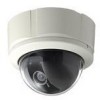JVC TK-C215V4U Instructions - Page 7
Operating Precautions, All Interconnecting Equipment must be UL
 |
UPC - 046838023170
View all JVC TK-C215V4U manuals
Add to My Manuals
Save this manual to your list of manuals |
Page 7 highlights
Operating Precautions ⅷ To save energy, when it is not being used turn the system's power off. ⅷ This camera has been designed for indoor use. It cannot be used outdoors. ⅷ Do not install or use the camera in the following places. ● In a place exposed to rain or moisture. ● In a place with vapor or oil soot, for example in a kitchen. ● In a temperature outside the operating temperature range (-10 f to 50 f). ● Near a source of radiation, X-rays, strong radio waves or magnetism. ● In a place where corrosive gasses are generated. ● In a place subject to vibration. ● In a place with excessive dirt. ● In an environment where there is cold air or near the air outlet of an air conditioner. ⅷ If this camera and the cables connected to this camera are used where there are strong electromagnetic waves or where there is magnetism present, for example near a radio or TV transmitter, power transformer or an electric motor, the picture may produce noise and the colors may be affected. ⅷ This camera incorporates an AGC circuit. As a result, when it is used under low light conditions, the camera sensitivity is automatically boosted and the picture may look uneven. This is not a malfunction however. ⅷ When this camera is used in the ATW mode, the recorded colors may be slightly different from the actual colors due to the operational principles of the auto-tracking white balance circuit. This is however not a malfunction. ⅷ If a high-intensity object (such as a lamp) is shot, the image on the screen may have vertical lines (smear) or blur (blooming) at its periphery. This is a characteristic of the CCD, and is not a defect. ⅷ Observe the following when carrying out camera maintenance. ● Turn the power OFF before proceeding to carry out maintenance. ● Clean the dome cover lens using a lens wiper cloth (or a tissue). If it is contaminated seriously, clean the contaminated part with a cloth (or a tissue) which has been soaked in a solution of water and a neutral detergent. ⅷ If the DAY/NIGHT switch is turned on, the mode changes automatically to black and white in dark places. As the sensitivity increases, the image may look grainy and white spots may appear. When changing modes, bright portions of image may be emphasized but this is not a failure of the camera. ⅷ When the supply voltage of the camera is low, the input protection circuit within the camera may be triggered and the power of the camera may turn off automatically. Make sure to use a supply voltage for the camera that is within 10 % of the rated voltage.) ⅷ When the camera is moved from a cold area to room temperature, condensation may occur causing the camera to malfunction as a result. In this case, turn on the power after waiting for a few hours. ⅷ This unit enlarges the rotation angle to support wide range set up. For TK-C215V4 , when the zoom of the lens is set to WIDE end and the tilt angle is set around ±80Њ,the dome cover can be visible into the image depending on the rotation angle. In this case, adjust the image angle if necessary. (A pg. 19) ⅷ All Interconnecting Equipment must be UL Listed. 7















